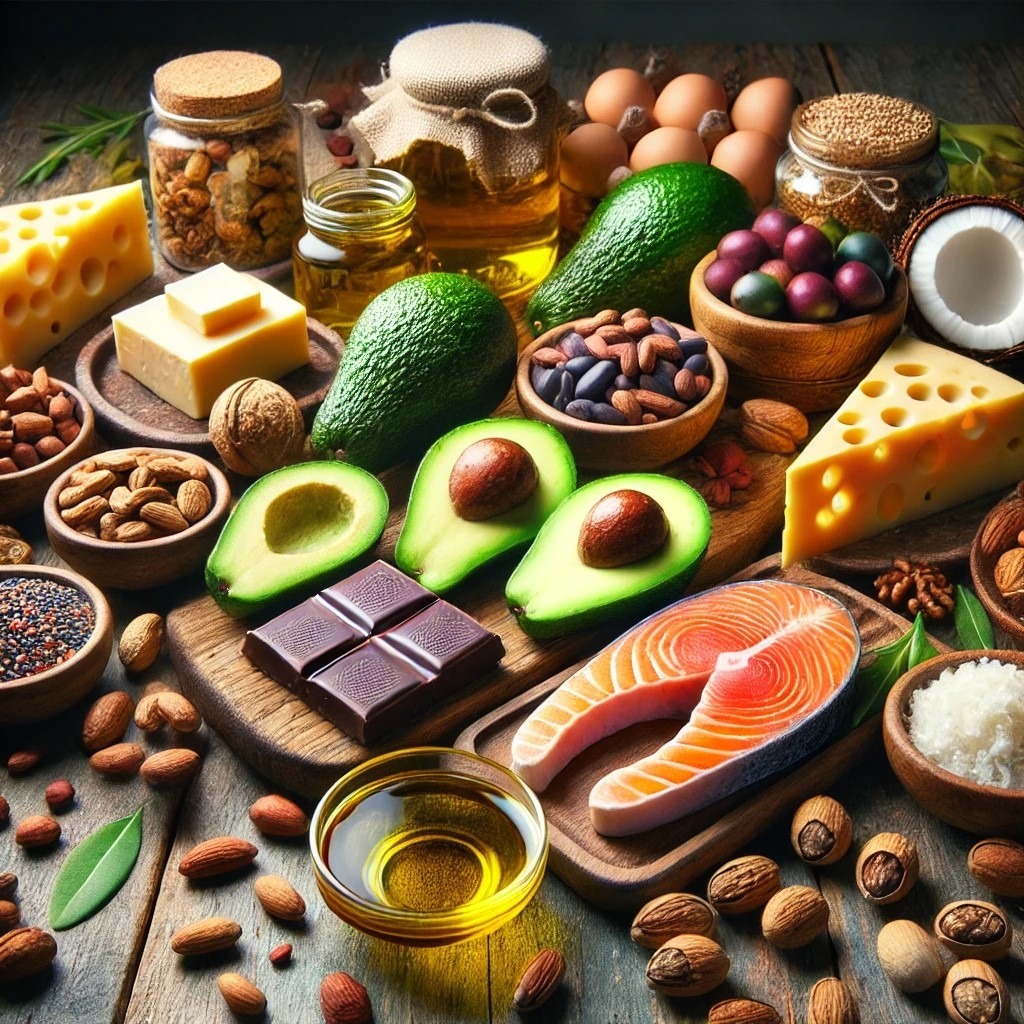KETO FATS: THESE SOURCES WE RECOMMEND
Not Every Fat is Keto Fat
Embarking on a ketogenic diet, a strategic low-carb diet aimed at substantial weight loss, necessitates a nuanced understanding of dietary fats. Contrary to popular belief, not all fats are created equal, especially when adhering to a keto regimen that emphasizes fat quality and healthy fats as primary energy sources. In the world of keto, distinguishing between saturated fats, monounsaturated fats, and polyunsaturated fats is crucial.
Monounsaturated and polyunsaturated fats, including omega-3 and omega-6 fatty acids found in fatty fish and avocado oil, are praised for their heart-healthy benefits, improving blood lipid levels, and supporting weight loss. However, not all fats align with keto principles. Cooking oils rich in polyunsaturated fats, such as certain vegetable oils, can disrupt the delicate balance of omega fatty acids, potentially hampering your progress. Thus, selecting high-quality MCT oil, grass-fed butter, and other keto-friendly fats is essential for maintaining ketosis and achieving your weight loss goals. In essence, the ketogenic diet isn’t just about cutting carbs; it’s about choosing the right fats to fuel your journey.
Saturated Fatty Acids
Saturated fats have been vilified in the diet industry for decades, often blamed for increasing the risk of heart disease and poor blood lipid levels. However, within the context of a ketogenic diet, this narrative shifts. Recent studies suggest that high-quality saturated fats, such as those found in grass-fed butter, MCT oil, and coconut products, can actually play a pivotal role in enhancing heart health, stabilizing blood lipid levels, and supporting weight loss.
These fats, integral to the ketogenic diet, provide a stable source of energy, promoting a state of ketosis where the body efficiently burns fat for fuel. Moreover, saturated fats are key for the absorption of certain nutrients and antioxidants, which are crucial for fighting free radicals and reducing inflammation. The keto diet thus not only focuses on low-carb intake but also on incorporating healthy, saturated fats from quality sources like fatty fish and avocado oil. By prioritizing fat quality, individuals on a ketogenic diet can optimize their health outcomes, contradicting the outdated stigma surrounding saturated fats.
Monounsaturated Fatty Acids
In the landscape of the ketogenic diet, where healthy fats reign supreme, monounsaturated fatty acids (MUFAs) hold a place of honor. These heart-healthy fats, predominant in foods like avocados, nuts, and high-quality olive oil, play a pivotal role in enhancing the nutritional profile of a low-carb diet. Avocado oil, a keto favorite, is not just a versatile cooking oil; it’s a powerhouse of monounsaturated fats that contribute to better heart health and improved blood lipid levels.
MUFAs are celebrated for their ability to support weight loss, reduce the risk of heart disease, and stabilize blood sugar levels—key factors in the success of a ketogenic lifestyle. By integrating foods rich in monounsaturated fats, individuals following a ketogenic diet can ensure a balanced intake of healthy fats, promoting a state of ketosis while fostering overall well-being. The emphasis on fat quality, particularly the inclusion of monounsaturated fats, distinguishes the ketogenic diet from other low-carb diets, highlighting its potential for sustainable, healthy weight loss and metabolic health.
Polyunsaturated Fatty Acids
Polyunsaturated fatty acids (PUFAs), including omega-3 and omega-6 fatty acids, are essential components of a ketogenic diet focused on heart health and weight loss. Found in fatty fish, flaxseeds, and walnuts, these fats are crucial for maintaining optimal health, especially when following a low-carb, high-fat diet like keto. The balance between omega-3 and omega-6 fatty acids is particularly important, as it can influence inflammation levels, heart health, and overall well-being.
Omega-3 fatty acids, prevalent in fatty fish like salmon and in supplements like fish oil, are known for their anti-inflammatory properties and their role in preventing heart disease. They can improve blood lipid levels and support brain health, making them indispensable in a ketogenic diet. Conversely, while omega-6 fatty acids are also essential, a common dietary pitfall is consuming them in excess, which can promote inflammation.
For those on a ketogenic diet, prioritizing foods high in omega-3s, while maintaining a balanced intake of omega-6s, ensures the benefits of polyunsaturated fats are fully realized. This strategic approach to fat quality supports the ketogenic principle of promoting weight loss and health through a careful selection of nutritious, high-quality fats.
It’s All About the Distribution
When it comes to the ketogenic diet, the mantra “It’s All About the Distribution” underscores the importance of balancing various types of fats to achieve optimal health and weight loss. The keto philosophy emphasizes a meticulous blend of saturated, monounsaturated, and polyunsaturated fats, each constituting a third of the total fat intake. This balanced approach ensures the body receives a diverse range of healthy fats, including omega-3 and omega-6 fatty acids, MCT oil, and high-quality cooking oils like avocado oil.
Incorporating a variety of fat sources, such as grass-fed butter for saturated fats, nuts and olive oil for monounsaturated fats, and fatty fish for polyunsaturated fats, supports a well-rounded ketogenic diet. This distribution not only aids in maintaining ketosis—a metabolic state where the body efficiently burns fat for energy—but also contributes to reduced risks of heart disease, improved blood lipid levels, and enhanced weight loss. By focusing on the quality and variety of fats, individuals following a keto diet can ensure they are nourishing their bodies adequately, reinforcing the diet’s potential for sustainable health benefits.
Caution with Heat
When adopting a ketogenic diet, understanding the impact of heat on fats is crucial for preserving their nutritional integrity and ensuring the diet’s effectiveness. Not all fats are created equal in the face of heat: polyunsaturated fats, including omega-3 and omega-6 fatty acids found in oils like flaxseed and fish oil, are particularly vulnerable to oxidation when heated. This process can produce harmful free radicals, which are associated with an increased risk of inflammation, heart disease, and other health issues.
To mitigate these risks, it’s essential to choose cooking oils with a high smoke point, such as avocado oil and refined coconut oil, for high-heat cooking and frying. These oils are rich in monounsaturated and saturated fats, respectively, which are more stable at high temperatures and less likely to oxidize. Conversely, oils high in polyunsaturated fats are best reserved for cold dishes or added to foods after cooking to preserve their health benefits.
Practicing caution with heat not only ensures the nutritional quality of fats in the ketogenic diet but also aligns with the overarching goal of promoting weight loss and heart health through a diet rich in high-quality, healthy fats. By understanding the properties of different fats and how they react to heat, keto enthusiasts can make informed choices that enhance their diet’s effectiveness and safeguard their health.
What Can I Use for Frying?
Navigating the world of fats and oils for frying within the ketogenic diet can be a culinary adventure, emphasizing the importance of choosing the right cooking oils to maintain health benefits, including weight loss and heart health. When it comes to frying on a keto diet, the focus shifts to oils that can withstand high temperatures without breaking down or oxidizing, which could otherwise lead to the formation of unhealthy free radicals.
For those on a ketogenic diet, high smoke point oils are the gold standard for frying. Avocado oil, known for its monounsaturated fat content, stands out as a top choice due to its ability to handle high heat, making it ideal for frying and sautéing. Similarly, coconut oil and MCT oil are celebrated in the keto community not only for their fat quality but also for their stability at high temperatures. Refined versions of these oils, such as refined coconut oil, offer a higher smoke point compared to their unrefined counterparts, making them more suited for high-heat cooking.
Moreover, for keto enthusiasts looking for variety, other options like grass-fed ghee and animal fats (e.g., lard) provide a spectrum of flavors while ensuring the diet remains aligned with its low-carb, high-fat principles. Incorporating these oils into your ketogenic diet allows for a diverse, flavorful culinary experience that supports ketosis, weight loss, and overall wellness. Choosing the right oil for frying is thus a crucial step in optimizing the health benefits of the ketogenic lifestyle.
In conclusion, selecting oils with high smoke points, such as avocado oil, refined coconut oil, and MCT oil, is essential for frying on a ketogenic diet. These oils not only enhance the flavor of foods but also contribute to the diet’s effectiveness in promoting weight loss, heart health, and metabolic benefits. By carefully choosing cooking oils, keto followers can enjoy delicious, fried foods without compromising their health goals.
Conclusion
If you eat a balanced diet, you don’t have to worry too much about fat distribution. However, nowadays many people lack Omega 3 fatty acids, which can be supplemented by consuming algae and algae oil, for example. Our Keto On The Go is also a small powerhouse of good fats, convincing not only with quality but also with taste!
| Fat Source | Type of Fat | Calories per 100g | Total Fat (g) | Saturated Fat (g) | Mono unsaturated Fat (g) | Poly unsaturated Fat (g) | Notable Nutrients |
|---|---|---|---|---|---|---|---|
| Avocado Oil | Mono unsaturated | 884 | 100 | 12 | 71 | 13 | Vitamin E |
| Coconut Oil | Saturated | 862 | 100 | 87 | 6 | 2 | MCTs, Vitamin E |
| Olive Oil (Extra Virgin) | Mono unsaturated | 884 | 100 | 14 | 73 | 11 | Vitamin E, K |
| Butter (Grass-fed) | Saturated | 717 | 81 | 51 | 21 | 3 | Vitamin A, E, K2, Butyrate |
| MCT Oil | Saturated | 884 | 100 | 100 | 0 | 0 | Caprylic/Capric acid |
| Walnuts | Poly unsaturated | 654 | 65 | 6 | 9 | 47 | Omega-3 ALA, Vitamin E |
| Salmon (Wild) | Poly unsaturated | 208 | 13 | 3 | 4 | 5 | Omega-3 EPA/DHA, Vitamin D |
| Ghee | Saturated | 900 | 100 | 60 | 28 | 5 | Vitamin A, E |







